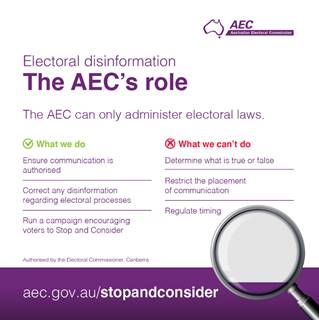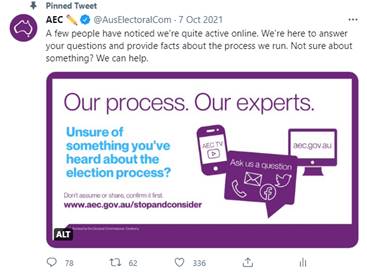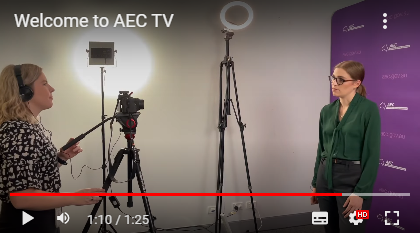Australian Electoral Commission


The Australian Electoral Commission has today launched a disinformation register debunking mistruths spread about federal election processes.
Australian Electoral Commissioner Tom Rogers said the register is the latest tool in the AEC’s ongoing fight against misleading and deceptive information about how elections are run.
“We’re not messing around,” said Mr Rogers.
“The Australian vote belongs to all Australians and there is freedom of political communication. However, if you spread incorrect information about the processes we run – deliberately or otherwise – we’ll correct you.”
“False information about the free, fair and secure election process that has operated in Australia for many years can do significant damage to public trust.”
“Scrutiny is important but it must be well informed. Australian elections are too important to let these things go through to the keeper, especially when people aren’t acting in good faith.”
The AEC Disinformation Register already contains several examples of incorrect information spread online in late 2021 and early 2022.
Each piece of disinformation the AEC has discovered is presented in the register with information about the platform it was spread on, the timing, the factual information regarding the matter and AEC actions taken to correct the record. The register will be updated regularly in the lead-up to, and during, the 2022 federal election period.
“The register is a searchable database of mistruths the AEC has identified about Australian election processes – ranging from the sophisticated to the ridiculous,” Mr Rogers said.
“The message here is simple: the AEC will not tolerate the spread of mis or disinformation about our electoral system, no matter the source,” Mr Rogers said.
The AEC’s approach to electoral disinformation is underpinned by the principles outlined in the AEC Reputation Management Strategy.
 While the AEC is not the arbiter of truth regarding political communication we will again conduct a campaign at election time alerting people to ‘Stop and Consider’ the source of information they see, hear or read.
While the AEC is not the arbiter of truth regarding political communication we will again conduct a campaign at election time alerting people to ‘Stop and Consider’ the source of information they see, hear or read.
This campaign attracted more than 63 million social media impressions during the previous federal election and 100,000 click throughs to website material. The campaign will be expanded for the 2022 federal election.
In addition, if political communication brought to our attention does not feature the required authorisation message we will seek to have that remedied so voters know who is communicating with them.
 The AEC’s active and, at times, forthright approach to social media engagement is a key part of combatting electoral mis and disinformation online.
The AEC’s active and, at times, forthright approach to social media engagement is a key part of combatting electoral mis and disinformation online.
In addition to responding to people who tag the AEC’s accounts, we are using keywords to monitor conversations outside of our accounts. We will occasionally jump in to those conversations to provide facts about how electoral processes work.
 We are utilising a range of internally-produced short videos to address areas of potential mis or disinformation regarding electoral processes.
We are utilising a range of internally-produced short videos to address areas of potential mis or disinformation regarding electoral processes.
We use AEC TV videos on our website, in social media interactions, embedded in media releases and when engaging directly with media and other third parties.
We work closely with social media platform owners including Meta, Twitter, Google, Tencent, Tik Tok and Snap, to discuss and action electoral disinformation posted to their channels.
In the past fortnight alone, we have referred a small number of matters their way for consideration against their policies.
The Electoral Commissioner is personally conducting a range of briefings with key media outlets across Australia in advance of the federal election.
These sessions provide critical details of how the election will be conducted and open up direct lines of communication to inform accurate reporting regarding election processes.
Our strategies to combat electoral disinformation sit among a broader range of safeguards for the 2022 federal election. These include procedural integrity, cyber security, physical security and the support of the Electoral Integrity Assurance Taskforce.